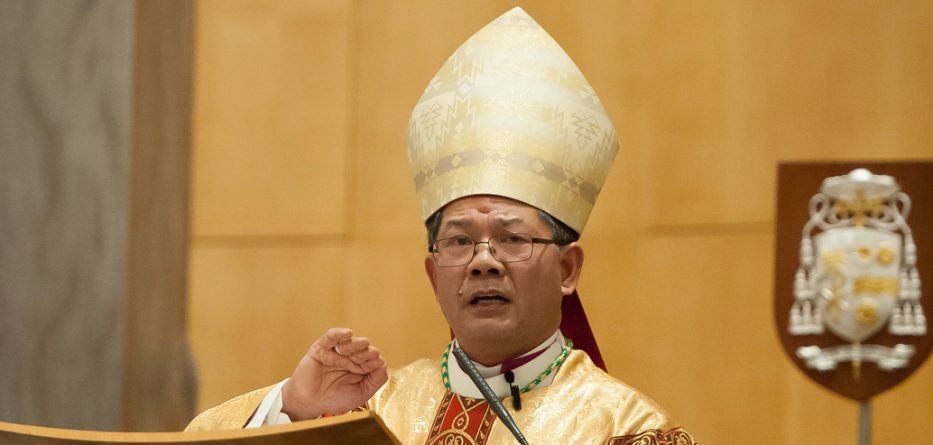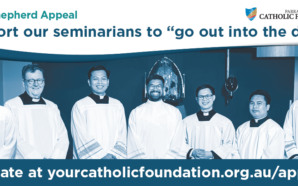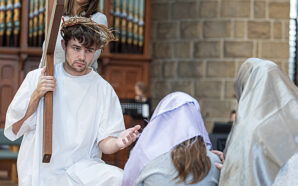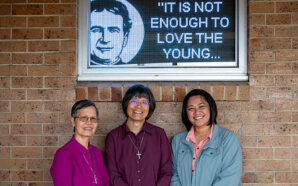Most Reverend Vincent Long Van Nguyen OFM Conv DD STL, Bishop of Parramatta
Homily for Pontifical Votive Mass of Our Lady of Lourdes with the Rite of Anointing of the Sick on the occasion of World Day of the Sick in Year A 2017 at Mary, Queen of the Family, Parish, Blacktown.
9 February 2017
Dear friends in Christ,
Today we come together to celebrate the World Day of the Sick. I welcome all of you especially the sick and the elderly. I welcome also all those who work in the ministry of care and service, in particular, Dr Mary McCaskill, Executive Medical Director of Westmead Children’s Hospital and representatives from St John of God Health Care, Ephpheta Centre, Catholic Healthcare, St Gabriel’s Primary School. We are truly grateful to you for your dedication, commitment and witness. May our gathering this morning be a sign that the Christian community will never be found lacking in mobilising its charism of love.
The Word of God that we’ve just heard encourages us to reach out to others offering comfort, healing and hope in times of affliction. In the first reading, the prophet Isaiah writes about the imminent liberation of Israel. For 50 years or so, the people of God had to live in exile and their homeland was destroyed. When the people of Israel had given up any hope of returning home, when they felt crushed and despondent, Isaiah consoled them with a message of hope. The Lord will send peace flowing like a river. Like a mother, the Lord will comfort and nurse her afflicted children.
The Word of God that we’ve just heard encourages us to reach out to others offering comfort, healing and hope in times of affliction.
The captive Jews did return to their homeland and they learned a valuable lesson. They learned that true faith was not about building magnificent temples and elaborate ceremonies; they learned that being God’s people was not about being strong and powerful in the worldly sense. It was all about humble faith and tenacious trust. It was all about living in justice, tender love and goodness. It was all about living justly, loving tenderly and walking humbly with God.
The Gospel illustrates how faith and trust in God can save the day. Whereas Isaiah consoles and urges the people not to give up their faith, the Gospel story shows us an example of that faith. We are told that the wine ran out in the middle of the wedding banquet. It was Mary who was aware of this potentially embarrassing situation. Perhaps it is a woman’s instinct when it comes to feeding others. I know every time I come home, the first thing my mother worries about is to feed me.
They learned that true faith was not about building magnificent temples and elaborate ceremonies
Mary not only picks up the crisis but she also knows where to turn to for help. They have no wine left, she tells Jesus. Despite his mysterious answer, Mary already believes that Jesus will intervene. She tells the attendants: “Do whatever he tells you”. These words contain all of Mary’s faith and trust in Jesus. She anticipates God’s grace by preparing herself to receive it. We are reminded of the story of Jesus feeding the multitude in the desert. There the disciples wanted to send the people away. They acted in fear and showed lack of faith. By contrast, Mary engaged the people and pleaded with Jesus on their behalf. She acted in solidarity with the afflicted and demonstrated her tremendous faith and love.
Pope Francis, in a reflection upon the gift of faith offered this insight, “The proof of authentic faith in Jesus is self-giving and the spreading of love for our neighbours, especially for those who do not merit it, for the suffering and for the marginalised.”
My brothers and sisters, the self-giving that Pope Francis invites us to embrace is quite evident in today’s Gospel – in the actions of Jesus – in the concern of Mary – and in the efforts of unknown servants who were willing to go beyond themselves for the well-being of others.
I welcome all of you especially the sick and the elderly.
Such selfless love – which is so often a quality of caregivers who respond to human needs – is a love that we are all challenged to make our own – even those of us who ourselves are sick and suffering. Just as Jesus’ selfless embrace of his cross gave way to life, we’re called through Baptism to carry our crosses with the same selfless spirit that Jesus maintained – and so find meaning, life and peace, even in our suffering.
The church as an institution has been shown to lack compassion and even to act with hypocrisy, especially in relation to victims of sexual abuse. In the spirit of humility and repentance, we need to focus our attention squarely on how we follow the compassionate Jesus and how authentic we are in being the sacrament of God’s compassion and care for the least and the last. The church is first and foremost a presence, an oasis of hope and Good News. We must learn to be a soothing presence, a warmth of God’s care and a gentle reach of God’s hand, affirming, healing and uplifting.
Let us pray that the miracle at Cana may happen again in our lives and in our church. May we learn the rhythm of dying and rising, of letting the new wine flow in place of the old. May Mary’s example of surrendering in trust help us to respond to our situations of need and calamity. May we learn with the wedding guests at Cana to drink the new wine of deep trust, deeper love and deeper commitment each day in our pilgrimage to God.








